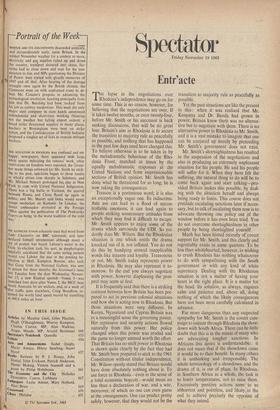Entr'acte
THE lapse in the negotiations over Rhodesia's independence may go on for some time. This is no reason, however, for believing that the negotiations are over. If it takes twelve months, or even twenty-four, before Mr. Smith or his successor is back seeking discussions, that will be no great loss. Britain's aim in Rhodesia is to secure the transition to majority rule as peacefully as possible, and nothing that has happened in the past few days need have changed this. To believe otherwise is to be taken in by the melodramatic behaviour of the Rho- desia Front, matched at times by the equally melodramatic responses at the United Nations and from impressionable sections of British opinion. Mr. Smith has done what he threatened for so long; he is now taking the consequences. • Treason is a portentous word; it is also an exceptionally vague one. its indiscrimi- nate use can lead to a flood of uncon- trollable emotions; it can lead again to people striking unnecessary attitudes from which they may find it difficult to escape. Mr. Smith appears to enjoy some of the drama which surrounds the UDI. So evi- dently does Mr. Wilson. But the Rhodesian situation is one which needs the drama knocked out of it, not inflated. You do not do this by bandying around inapplicable words like treason and loyalty. Treasonous or not, Mr. Smith today represents power in Rhodesia. He may also represent it to- morrow. In the end you always negotiate with power, however displeasing the pros- pect may seem at first.
It is frequently said that there is a striking contrast between how Britain has been pre- pared to act in previous colonial situations and how she is acting now in Rhodesia. But those situations were very different. In Kenya, Nyasaland and Cyprus Britain was in a meaningful sense the governing power. Her repressive and security actions flowed naturally from this power. Her policy changed when this power was eroded and the game no longer seemed worth the effort. That Britain has no such power in Rhodesia is shown quite clearly by the fact that had Mr. Smith been prepared to stick to the 1961 Constitution without titular independence, Mr. Wilson openly stated that Britain would have done absolutely nothing about it. To use force in Rhodesia—even in the sense of a total economic boycott—would mean no less than a declaration of war, and a war, moreover, of which no one can even guess at the consequences. One can predict pretty safely, however, that they would not be the transition to majority rule as peacefully as possible. - Yet the past situations are like the present in this : when it was realised that Mr. Kenyatta and Dr. Banda had groWn in power, Britain knew thete was no alterna- tive but to negotiate with them. There is no alternative power in Rhodesia to Mr. Smith, and it is a vast mistake to imagirie that one can be conjured up merely by pretending Mr. Smith's government. does not exist.
Mr. Smith's shortsightedness has resulted in the suspension of the negotiations and also in producing an extremely unpleasant situation for his people. He and his people will suffer for it. When they have felt the suffering, the natural thing to do will be to come back again and start talking—pro- vided Britain makes this possible, by deal- ing with the situation herself and always being ready to listen. This course does not preclude escalating sanctions later if neces- sary, but to talk of'escalating them now is to advocate throwing one policy out pf the window before it has even been tried. You do not overcome shortsightedness in, other people by being shortsighted yourself. Much has been hinted recently of covert support for Mr. Smith, and this clearly and regrettably exists in some quarters. To be less than wholehearted, however, in wishing to crush Rhodesia has nothing whatsoever to do with sympathising with the Smith government or with any kind of white supremacy. Dealing with the RhOdesian situation is not a matter of having your heart in the right place. It is a matter for the head. Its solution, as always, requires calm • and patience and, above all. doing nothing of which the. likely ,consequences have not been most carefully calculated in advance.
Far more dangerous than any suspected sympathy for Mr. Smith is the covert cam- paign to initiate through Rhodesia the show- down with South Africa. There can be little doubt that this is in the minds'of many who are advocating tougher sanctions. In Africans this desire is understandable : it does not mean that if the showdown came it would be to their benefit. In many: others it is unthinking and irresponsible. The whole terminology of a showdown, and the drama of it, is out of place. In Rhodesia, in Southern Africa as a whole, the task is to lower temperatures, not to raise them. Excessively punitive actions seemto us abhorrent and pointless, and likely, in the end to achieve precisely the oppogite of what they intend.


































 Previous page
Previous page